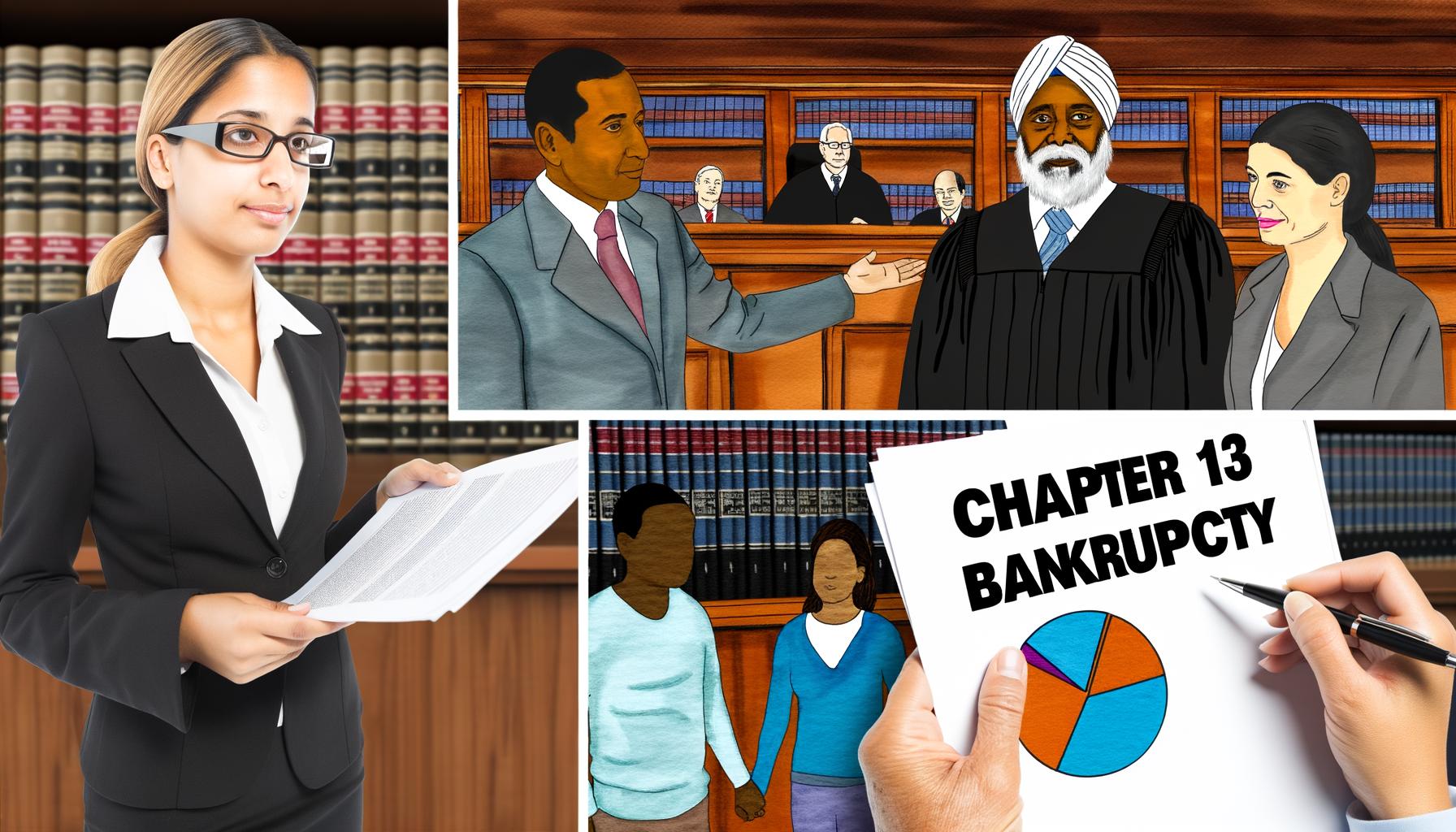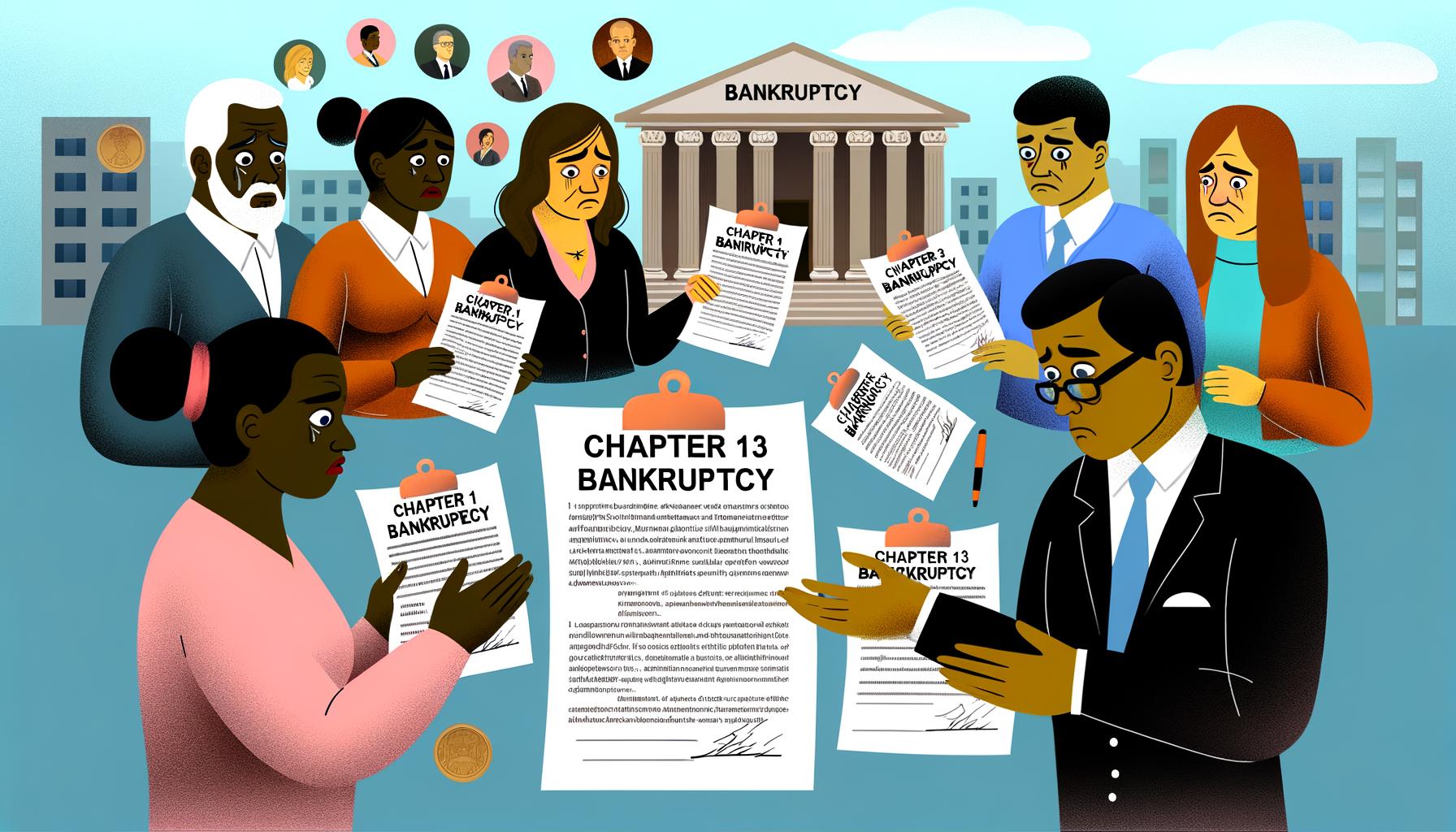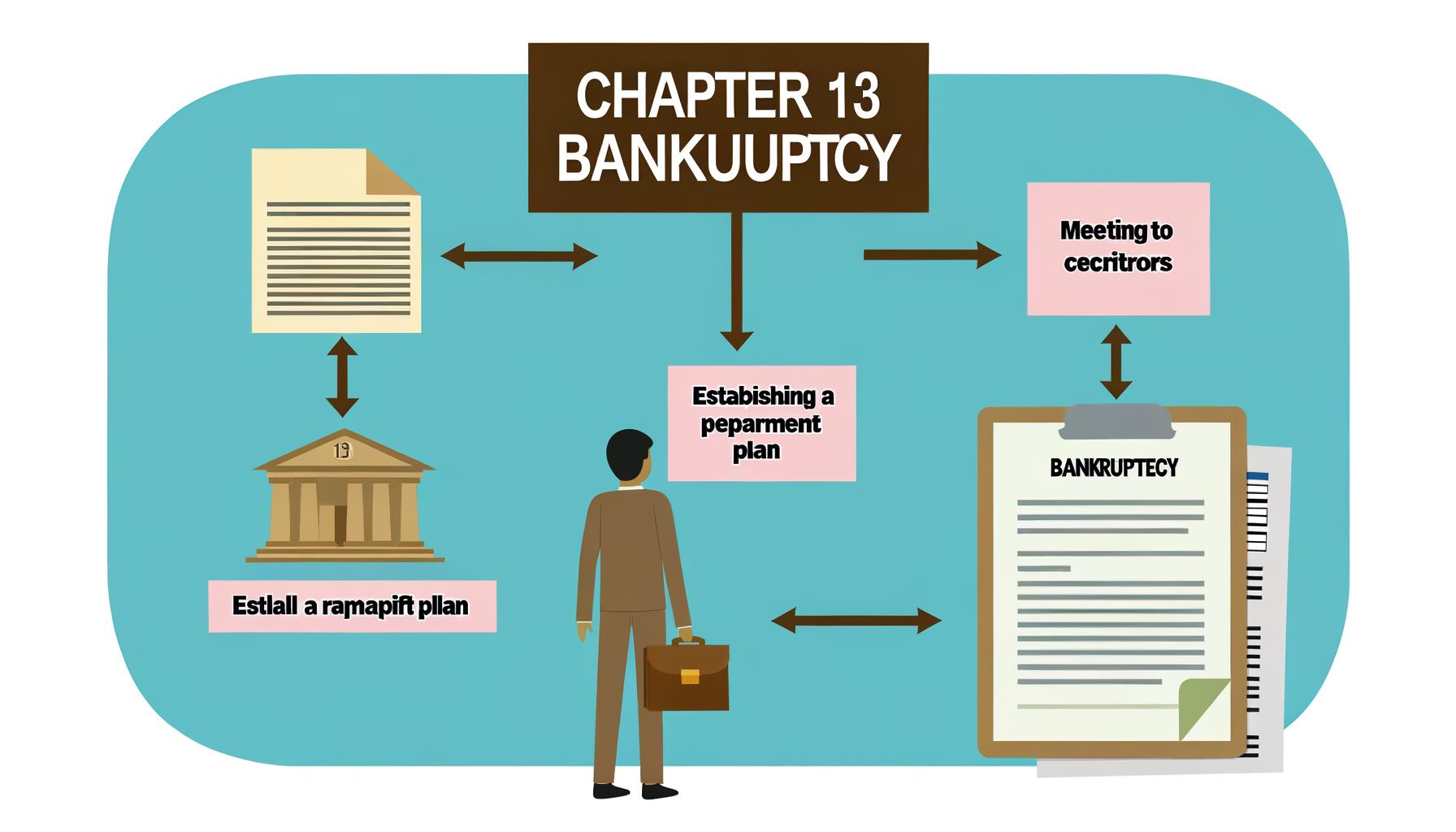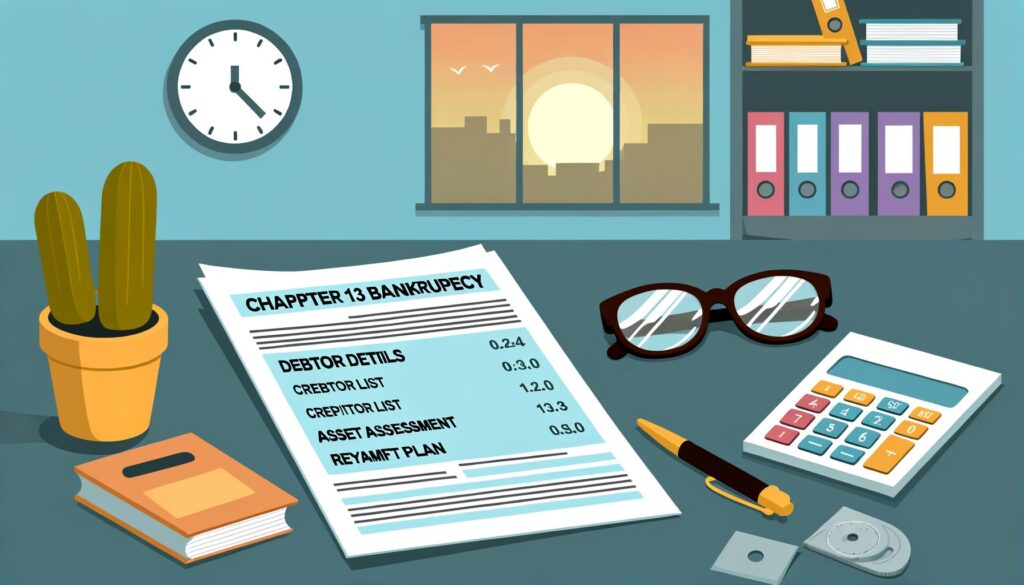Chapter 13 bankruptcy serves as a lifeline for families grappling with financial hardship, offering a structured and supportive route to regain financial stability. Unlike other types of bankruptcy, Chapter 13 is designed to help debtors with regular income create a manageable repayment plan over three to five years. This provision allows families the invaluable opportunity to repay their debts without liquidating valuable assets such as their homes or cars-providing much-needed relief during tough economic times.
In Chapter 13 bankruptcy, individuals reorganize their existing debts into a coherent plan that matches their monthly income, allowing them to address overdue obligations in an orderly manner. This type of bankruptcy is particularly beneficial for families in Lakewood who are struggling but still have consistent earnings.
It enables them to keep their homes out of foreclosure by making it possible to pay off arrears on secured debts over time while simultaneously managing unsecured debts like credit cards or medical bills.
For many Lakewood residents, the decision to file for Chapter 13 bankruptcy can be daunting, but understanding its importance and benefits eases the process significantly. Not only does it provide legal protection from creditors’ collection activities and stop wage garnishments, but it also offers an avenue for credit restoration upon successful completion of the repayment plan.
By mitigating immediate financial pressure and establishing clear pathways toward debt resolution, Chapter 13 bankruptcy emerges as an essential tool for families aiming to rebuild their financial lives securely and sustainably.
Understanding the Eligibility Criteria
Engaging with chapter 13 bankruptcy involves meeting specific eligibility criteria designed to ensure the process is suitable for individuals genuinely needing relief. To qualify for Chapter 13 bankruptcy, your secured and unsecured debts must fall within certain limits. As of the latest adjustments, these limits are set at $2,750,000 total-any more than this amount may disqualify an individual from filing under Chapter 13 and might require exploring other options like Chapter 7 or Chapter 11 bankruptcy.
Income stability is another crucial requirement when considering Chapter 13 bankruptcy. Applicants must demonstrate a steady income source that will support the structured repayment plan mandated by the court. This income can come from different sources such as wages, self-employment earnings, or even social security benefits. The goal is to show that you have enough disposable income after necessary living expenses to make regular payments according to the proposed debt reorganization plan.
The types of debt eligible for inclusion in Chapter 13 play a significant role in determining eligibility. Generally, most personal debts such as mortgages, car loans, and credit card balances can be included. However, certain obligations like alimony payments, child support, and recent tax liabilities are typically non-dischargeable through Chapter 13 proceedings. Being familiar with these distinctions helps ensure that your repayment plan is comprehensive and viable within legal constraints.
| Eligibility Criteria | Details |
|---|---|
| Total Debt Limit | $2,750,000 (as of latest adjustments) |
| Income Requirements | Steady income sufficient for repayment plan |
| Types of Debts Included | Most personal debts (e.g. mortgages, car loans), excluding alimony/child support/recent taxes |
Benefits of Chapter 13 Bankruptcy for Families
Chapter 13 bankruptcy offers several significant benefits, particularly for families in Lakewood who are struggling with financial difficulties. One of the primary advantages is the potential restoration of credit over time. While any type of bankruptcy will initially impact your credit score, Chapter 13 allows debtors to demonstrate responsibility through a structured repayment plan.
Successfully adhering to this plan can positively affect your credit report, showcasing your commitment to repaying debts and improving your financial situation. Over the long term, this can open doors to better interest rates and lending opportunities.
Protection of Valuable Assets
Another critical benefit of Chapter 13 bankruptcy is its ability to protect valuable assets such as the family home and car. Unlike Chapter 7 bankruptcy, which might require liquidation of certain assets to repay creditors, Chapter 13 focuses on restructuring debt without forcing individuals to surrender their property.
For many families in Lakewood facing foreclosure or repossession threats, this aspect offers immense relief and peace of mind. Maintaining ownership of essential assets is crucial not just for current stability but also for future security.
Structured Repayment Plans
Chapter 13 provides structured repayment plans that are tailored specifically to the debtor’s income. This customization ensures that families are only required to pay what they can afford while still maintaining basic living expenses.
The court will work with you to create a realistic budget that accommodates monthly payments towards your outstanding debts over a three – to five-year period. This stand-out feature makes Chapter 13 an attractive option compared to other forms of bankruptcy, such as Chapter 7, which may not offer flexibility in terms of repayment options.

By understanding and leveraging these benefits-credit restoration, protection of valuable assets like homes and cars, and structured repayment plans-families in Lakewood can navigate their financial challenges more effectively through Chapter 13 bankruptcy solutions tailored specifically for them.
The Chapter 13 Bankruptcy Process in Lakewood
Filing for chapter 13 bankruptcy in Lakewood involves a structured and detailed process designed to help families manage their debts while keeping their assets. The first step is to gather all necessary financial documentation, including income proof, list of all creditors, detailed expense reports, and any recent tax returns. These documents are crucial not only for the initial filing but also for crafting a feasible repayment plan that aligns with the family’s financial capabilities.
Once the documentation is complete, the next step involves formally submitting a bankruptcy petition to the local courthouse in Lakewood. It’s essential during this phase to ensure every detail is accurate and comprehensive to avoid delays in processing. After filing, an automatic stay goes into effect immediately, providing relief from collection efforts and foreclosure actions. This is particularly advantageous as it offers families breathing space from creditor harassment and allows them to focus on restructuring their finances.
Following the filing of the petition, a meeting known as a 341 meeting or Meeting of Creditors will be scheduled. During this meeting, debtors must answer questions posed by a trustee about their financial situation and repayment plan under oath.
It’s beneficial to have legal representation at this stage to navigate any complexities that may arise. If everything is in order, and after gaining court approval of the proposed repayment plan, families can then commence with making payments according to the agreed schedule over several years until debts are resolved or discharged.
Lastly, it’s beneficial for Lakewood residents undergoing chapter 13 bankruptcy to utilize local resources offering legal assistance. These might include nonprofit organizations specializing in financial counseling or community workshops that provide support throughout the bankruptcy process. By leveraging these resources effectively, families can significantly improve their chances of successfully completing their repayment plans and achieving long-term financial stability.
Common Challenges and How to Overcome Them
One of the most common challenges faced during the Chapter 13 bankruptcy process is adhering to the strict repayment plan established by the bankruptcy court. Since this plan can span three to five years, consistently making timely payments requires meticulous budgeting and financial discipline. Families may need to adjust their lifestyle and spending habits significantly to meet these demands.
To overcome this hurdle, it is crucial to create a detailed budget that accounts for all necessary expenses and sets aside funds specifically for repayment. Additionally, families should regularly review their finances and adjust as needed to stay on track.
Another potential obstacle is dealing with unexpected financial emergencies, such as medical bills or car repairs, which can disrupt the repayment schedule. To mitigate these unforeseen costs without jeopardizing the bankruptcy plan, it is advisable to establish an emergency fund before filing for Chapter 13 bankruptcy.
This fund acts as a financial cushion that can be accessed in times of need without causing missed payments or defaulting on the plan. Financial advisors also recommend keeping open lines of communication with creditors and informing them promptly if any changes affect your ability to make payments.
Legal hurdles are another significant challenge during Chapter 13 proceedings. Mistakes or incomplete documentation can delay the process or even result in dismissal of the case. Being prepared with all necessary paperwork from the onset helps avoid unnecessary complications. Essential documents include:
- Recent pay stubs
- Tax returns from previous years
- Documentation of all debts and assets
- A comprehensive list of monthly expenses
Lakewood has various local resources offering legal assistance, which could prove invaluable during this complex process. Engaging with a knowledgeable attorney who specializes in chapter 13 bankruptcy ensures that you are guided through each step correctly-from filing initial paperwork to attending mandatory court hearings-and increases your chances of successfully completing your repayment plan without major hiccups.
Real-Life Success Stories
Testimonial: The Johnson Family’s Path to Financial Recovery
The Johnson family, long-time residents of Lakewood, found themselves in a financial quagmire after a series of unfortunate events. Medical emergencies, coupled with unexpected job losses, left them buried under mounting debts. Turning to chapter 13 bankruptcy was a difficult decision but ultimately became their lifeline.

By working with a qualified bankruptcy attorney, they managed to set up a structured repayment plan that allowed them to keep their home and car while gradually paying off their debts over several years. Today, the Johnsons are back on their feet and have even started rebuilding their credit score through responsible financial management.
Case Study: Overcoming Debt While Protecting Assets
Consider the story of Maria and Carlos Rivera, another family from Lakewood who faced creditor harassment due to unpaid loans and medical bills. Filing for Chapter 13 bankruptcy offered them a legal shield against aggressive creditors and provided them the opportunity to catch up on delayed payments.
One key advantage for the Riveras was the ability to protect valuable assets that might have been lost in other forms of bankruptcy such as Chapter 7. The structured repayment plan tailored to their income played a critical role in allowing them breathing room to balance monthly expenses while addressing debt obligations systematically.
Advice From Those Who’ve Been There
Individuals like Jenna Thompson, who has successfully navigated through Chapter 13 bankruptcy, often emphasize the importance of staying disciplined throughout the repayment period. Jenna highlights how critical it is to adhere strictly to the budget laid out as part of the Chapter 13 plan and reiterates that any deviation could lead to complications or dismissal of the case.
Leveraging local resources in Lakewood such as financial counseling and support groups also proved invaluable for her journey toward financial health post-chapter 13 bankruptcy. Her experience serves as an encouraging testament that despite initial challenges, it’s entirely possible to emerge financially stable and wise after completing a Chapter 13 bankruptcy plan.
These stories provide tangible evidence that Chapter 13 bankruptcy can become a pivotal moment for families in Lakewood facing insurmountable debts. They underscore not just the legal protections but also the emotional relief that comes with knowing there is light at the end of what appears to be an endless tunnel of financial distress.
Seeking Professional Help
Securing professional assistance can be a crucial step for families navigating the complexities of chapter 13 bankruptcy. With so many legal and financial intricacies involved, consulting with seasoned bankruptcy attorneys and financial advisors in Lakewood can provide much-needed clarity and guidance. These professionals can help you understand your options, craft a customized repayment plan, and ensure that all necessary documentation is accurately completed and submitted.
When choosing a bankruptcy attorney, it’s important to conduct thorough research to find reputable individuals who have specialized experience in chapter 13 cases. Here are some key resources to consider:
– Online Reviews and Ratings: Look up reviews on legal websites or forums where past clients share their experiences.
– Local Bar Associations: Often provide lists of certified bankruptcy attorneys in Lakewood.
– Personal Recommendations: Ask friends or family members for referrals if they have undergone similar processes.
Understanding the benefits of professional consultation is essential. Hiring a knowledgeable attorney can help you avoid common pitfalls that could delay or derail your case. They will also assist in negotiating with creditors and ensuring compliance with court requirements, which can be particularly helpful if your financial situation is complicated by multiple sources of debt.
Before making a decision, prepare these questions to ask potential attorneys:
1. Experience and Specialization: How many Chapter 13 cases have you handled?
2. Success Rate: What percentage of your clients successfully complete their repayment plans?
3. Cost Structures: What are your fees, and do you offer payment plans?
4. Client Support: How often will we communicate during the process?
Seeking professional help isn’t just about finding someone to fill out forms-it’s about gaining a partner who understands the emotional toll of financial distress and provides the expertise needed to navigate through chapter 13 bankruptcy successfully.
Life After Chapter 13 Bankruptcy
Life after completing a Chapter 13 bankruptcy can be a pivotal period for families in Lakewood as they work to rebuild and strengthen their financial health. One of the first steps post-bankruptcy is to monitor your credit report closely.
It’s crucial to ensure that all debts discharged through Chapter 13 are accurately reflected on your credit report, which can significantly impact your recovering credit score. Regularly checking your credit report from the three major bureaus-Equifax, Experian, and TransUnion-can help you identify any discrepancies or lingering errors that need correction.
In addition to vigilant credit monitoring, adopting good financial habits is essential for maintaining stability and preventing future hardships. Families should create a comprehensive budget that details monthly income and expenditures. This budget will serve as a roadmap for managing finances effectively and ensuring that necessary expenses such as housing, utilities, groceries, and transportation are prioritized. Establishing an emergency fund is another critical step; even small, consistent contributions can accumulate over time and provide a valuable cushion against unexpected expenses.

Rebuilding credit after filing for chapter 13 bankruptcy also involves strategic use of new credit opportunities. Secured credit cards or small installment loans can be valuable tools when used responsibly-they offer a way to demonstrate reliable payment history to creditors once again. Timely payments on these accounts will gradually improve your credit score over time.
Additionally, it may be beneficial to consult with a financial advisor who specializes in post-bankruptcy planning. They can provide personalized advice tailored to your family’s specific situation in Lakewood and help implement strategies designed to foster long-term financial resilience.
| Key Steps | Description |
|---|---|
| Monitor Credit Report | Ensure debts discharged via Chapter 13 are accurately reflected. |
| Create Budget | Detail income and expenditures; prioritize necessary expenses. |
| Establish Emergency Fund | Consistent contributions provide a cushion against unexpected costs. |
Conclusion
Chapter 13 bankruptcy presents a valuable lifeline for families in Lakewood grappling with financial difficulties. By offering a structured repayment plan and protections for essential assets like homes and vehicles, it allows families to reclaim control of their finances and embark on a path toward stability. This process not only aids in mitigating immediate financial stress but also sets the groundwork for long-term credit restoration and economic well-being.
For many families, navigating their way through chapter 13 bankruptcy can seem daunting. However, understanding the eligibility criteria and being aware of the available local resources can significantly ease this journey.
Consulting with reputable bankruptcy attorneys and financial advisors can provide tailored guidance, ensuring that each step is managed efficiently and effectively. Their expertise can be instrumental in overcoming common challenges, such as sticking to repayment schedules or meeting income requirements, thereby increasing the likelihood of successfully completing the bankruptcy process.
In conclusion, Chapter 13 bankruptcy offers Lakewood families hope and a viable path towards financial recovery. It’s crucial to approach this option with comprehensive information and professional support to maximize its benefits.
By taking proactive steps to address debt through Chapter 13, families not only protect their most valued assets but also lay the foundation for a more secure financial future. Reaching out to qualified professionals can illuminate the best strategies tailored to individual circumstances, empowering families to take decisive action toward regaining their fiscal health and stability.
Frequently Asked Questions
Is Chapter 7 or 13 Worse?
Whether Chapter 7 or Chapter 13 is worse largely depends on an individual’s unique financial situation and goals. Chapter 7 typically involves liquidating assets to pay off unsecured debts, which can result in the loss of significant property but allows for a quicker discharge of debt.
On the other hand, Chapter 13 involves creating a repayment plan based on income, allowing individuals to keep their property while paying debts over time. While Chapter 13 can be less immediately painful in terms of asset loss, it ties up disposable income for three to five years.
Does a Chapter 13 Erase All Debt?
Filing for Chapter 13 does not erase all debt; instead, it restructures existing debts into a manageable repayment plan that typically lasts three to five years. Some types of debt may be discharged after the successful completion of this repayment period, including unsecured debts like credit card balances and medical bills.
However, certain debts such as child support obligations, student loans, and recent tax debts generally cannot be discharged through Chapter 13 bankruptcy.
What Is the Downside to Filing Chapter 13?
One downside to filing for Chapter 13 bankruptcy is that it requires a long-term commitment to a court-approved repayment plan that consumes a significant portion of disposable income over three to five years. During this period, the debtor must strictly adhere to budgetary constraints imposed by the bankruptcy court, limiting financial flexibility and ability to make discretionary purchases.
How Long Does It Take to Rebuild Credit After Chapter 13?
Rebuilding credit after completing a Chapter 13 repayment plan often takes several years but can begin immediately upon discharge. Initially, one’s credit score may remain low due to the bankruptcy’s presence on their record; however, consistently making timely payments on any remaining or new debt can gradually improve one’s creditworthiness over time.
Many find they can attain fair credit ratings within two years post-bankruptcy if they follow prudent financial practices.
What Will I Lose in Chapter 13?
In a Chapter 13 bankruptcy filing, individuals typically do not lose personal property because it revolves around repaying debts rather than liquidating assets like in Chapter 7 bankruptcy.
However, maintaining ownership comes at the cost of adhering strictly to the repayment plan approved by the court for several years—failing which could lead one back into severe financial turmoil with increased risk of losing protected assets under subsequent filings or creditor actions.”

